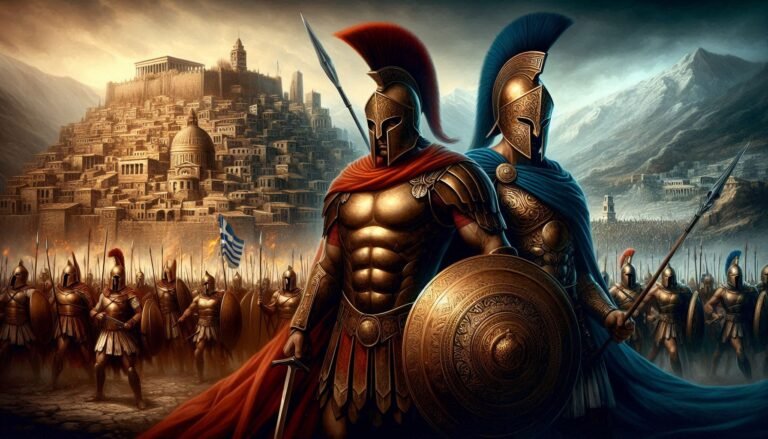The Trojan War stands as one of the most legendary conflicts in human history, immortalized by Homer’s Iliad and passed down through generations as a tale of heroism, love, betrayal, and divine intervention. But how much of this epic story is based on real events? Was there truly a war between Troy and Greece, or is it merely a myth woven by ancient storytellers? This article explores the historical evidence, mythical elements, and lasting legacy of the Trojan War.
The Myth of the Trojan War: Homer’s Iliad
Homer’s Iliad, written around 750 BCE, serves as the most famous account of the Trojan War. However, the story had likely been passed down through oral tradition for centuries before Homer recorded it.
The Cause of the War: The Judgment of Paris
The war is said to have begun with a divine quarrel. At the wedding of Peleus and Thetis, the goddess Eris (Discord) threw a golden apple inscribed with the words “For the fairest.” The three goddesses Hera, Athena, and Aphrodite each claimed the prize. They asked Paris, a Trojan prince, to judge.
Each goddess offered him a reward:
- Hera promised him power over all Asia.
- Athena offered him wisdom and skill in war.
- Aphrodite promised him the most beautiful woman in the world—Helen of Sparta.
Paris awarded the apple to Aphrodite, setting in motion the events of the war. Helen, already married to King Menelaus of Sparta, was either abducted or willingly eloped with Paris, sparking outrage in Greece.
The Greek Response and the Siege of Troy
Menelaus called upon his brother, King Agamemnon of Mycenae, who gathered an army of Greek warriors, including:
- Achilles, the nearly invincible warrior
- Odysseus, the cunning king of Ithaca
- Ajax the Great, a towering and formidable fighter
- Nestor, the wise and aged counselor
With over a thousand ships, the Greeks set sail for Troy, leading to a ten-year siege.
Key Events of the War
- The Wrath of Achilles: Homer’s Iliad begins in the ninth year of the war, focusing on Achilles’ rage after Agamemnon takes his war prize, Briseis. Achilles withdraws from battle, leading to Greek losses.
- The Death of Patroclus: Achilles’ beloved companion, Patroclus, is killed by Hector, prince of Troy. This enrages Achilles, who slays Hector in revenge and drags his body around Troy.
- The Fall of Troy: Though the Iliad does not describe the war’s end, later myths recount the famous Trojan Horse, a Greek deception orchestrated by Odysseus. The Greeks hid inside a giant wooden horse, which the Trojans brought into their city. At night, the Greeks emerged and sacked Troy.
The Aftermath
- Achilles was later killed by Paris, who shot an arrow guided by Apollo into his only weakness—his heel.
- Troy was destroyed, and its people were either killed or enslaved.
- The Greek heroes faced cursed journeys home (as seen in The Odyssey).
The Historical Trojan War: Did It Really Happen?
For centuries, historians debated whether the Trojan War was purely mythical. However, archaeological discoveries suggest Troy was a real city and that a conflict may have taken place.
1. Heinrich Schliemann’s Discovery (1870s)
The German archaeologist Heinrich Schliemann excavated Hisarlik, Turkey, uncovering ruins that matched ancient descriptions of Troy. His findings included:
- Layers of cities built on top of each other, showing multiple periods of destruction.
- Gold artifacts, which he called “Priam’s Treasure” (though their exact dating remains controversial).
2. The Real Cause of the War?
Some historians believe the Trojan War may have been a real conflict over trade routes, rather than a war for Helen. Troy’s strategic location near the Dardanelles Strait made it a wealthy city controlling trade between the Aegean and Black Seas. The Greeks may have attacked Troy to secure control of these vital trade routes.
3. The Timeline Debate
Evidence suggests that Troy VII (c. 1300–1180 BCE) was destroyed by war. This aligns roughly with the time period of the Mycenaean Greeks. However, no definitive evidence of a grand ten-year war or Greek coalition has been found.
Fact vs. Fiction: What We Know
| Element | Myth | Possible Truth |
|---|---|---|
| Helen of Troy | Abducted by Paris, causing the war | Possibly a political excuse for war |
| Trojan Horse | A giant wooden horse used for deception | No direct evidence, but Greek trickery in war was common |
| Achilles & Hector | Legendary duel between champions | Possible, but details likely exaggerated |
| Ten-Year War | Greeks besieged Troy for a decade | Conflict may have lasted years, but no firm timeline |
| Destruction of Troy | Burned and looted by Greeks | Troy VII shows evidence of destruction |
The Legacy of the Trojan War
The Trojan War left a cultural and literary legacy that continues to influence the world today.
1. The Impact on Ancient Greece
- A Model for Heroism: Achilles and Odysseus became symbols of bravery and cunning.
- Greek Identity: The war reinforced the idea of Greek unity against a common enemy.
2. Influence on Literature and Art
- Homer’s Iliad and Odyssey remain foundational texts in Western literature.
- Greek tragedies like Euripides’ The Trojan Women explore the human cost of war.
- The war inspired later Roman writers, including Virgil’s Aeneid, which tells the story of Aeneas, a Trojan survivor who founded Rome.
3. Influence on Modern Culture
- The term “Trojan Horse” is now used for deceptive strategies, including in cybersecurity.
- The war has been adapted in films, books, and TV series, such as Troy (2004) and The Song of Achilles (2011).
A War Between Myth and Reality
The Trojan War is a blend of history and legend, shaped by both fact and fiction. While archaeology confirms Troy’s existence, many elements of Homer’s story remain mythical embellishments.
Yet, whether real or imagined, the war has endured for millennia, shaping literature, philosophy, and storytelling. It is a timeless reminder of the power of myth, the cost of war, and the enduring search for glory and immortality.
As long as stories are told, the legend of the Trojan War will never fade—its echoes continue to inspire us, just as they did the ancients.





